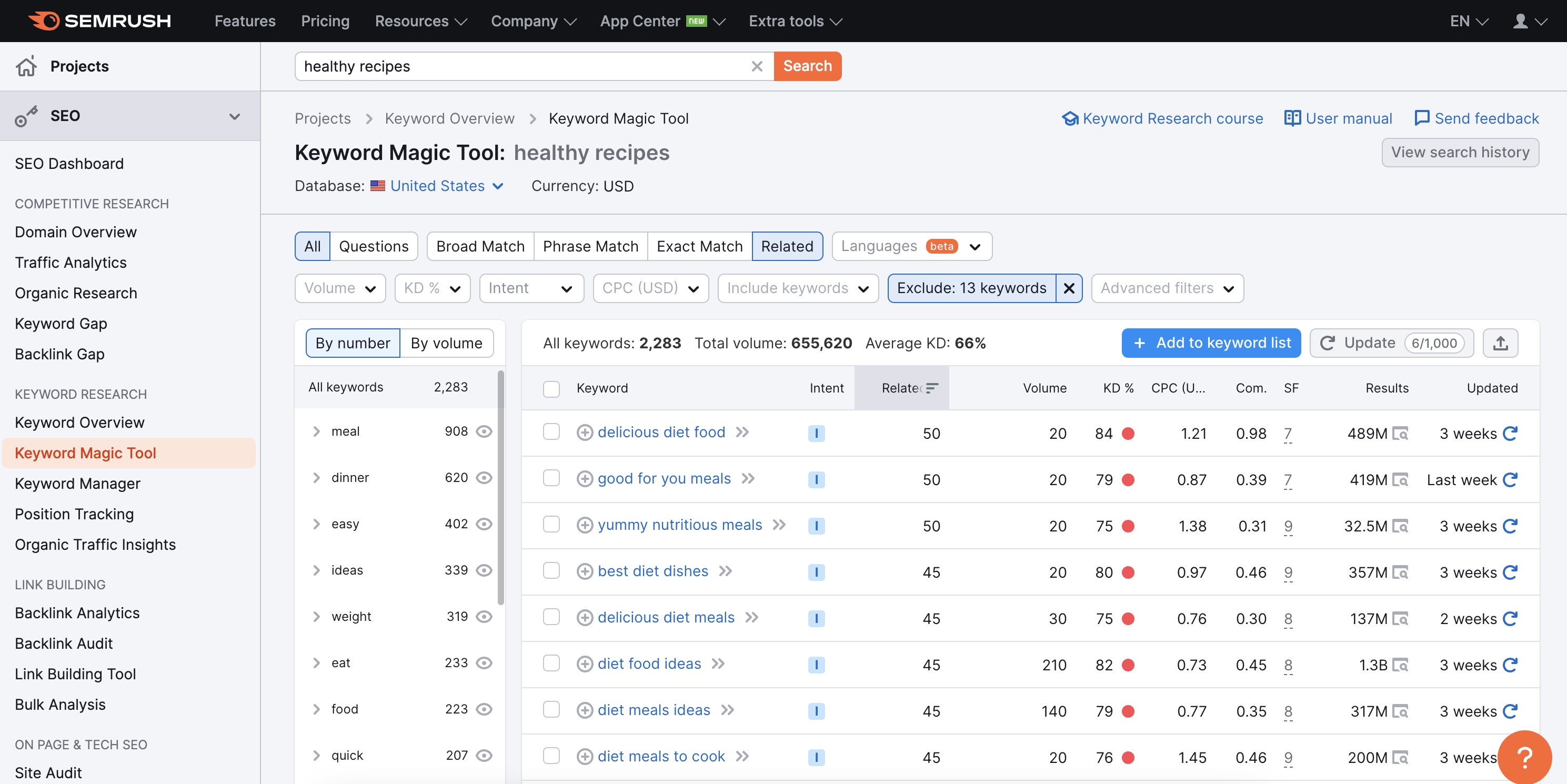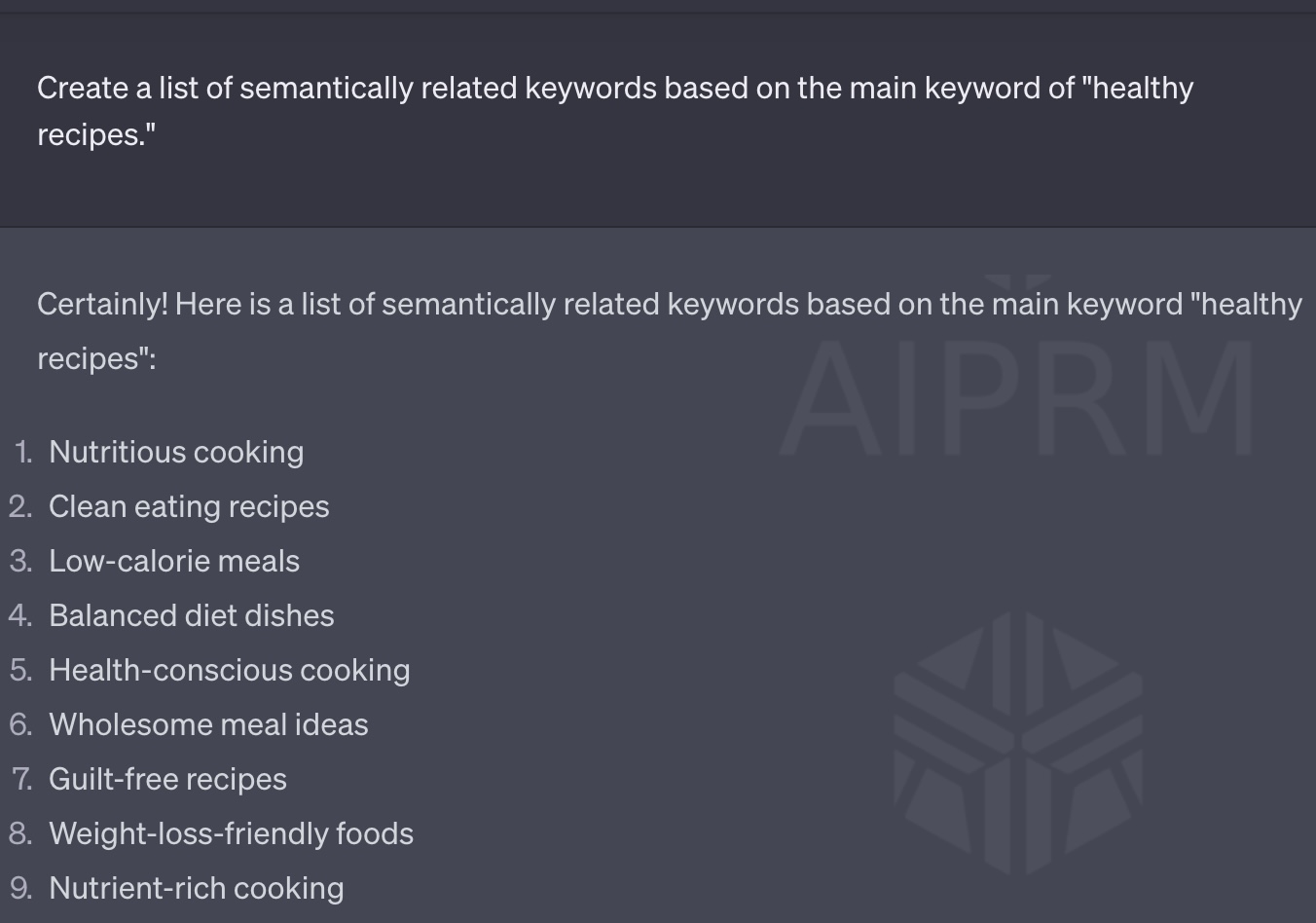In the ever-evolving world of digital marketing, staying ahead of the game requires more than just understanding keywords – it's about grasping the nuances of semantically related keywords.
Semantically related keywords can help you connect with your audience, increase content engagement, and boost your chances of getting ranked higher in search engine results.
In this post, we explain what semantically related keywords are, how they benefit, and how you can find them.
Let’s begin.
What are semantically related keywords?
Before we dive into the depths of semantically related keywords, let's ensure we're all on the same page regarding their definition and significance.
Defining semantically related keywords
Semantically related keywords are not just random words thrown together. They are words or phrases that share contextual and semantic relationships with your primary keyword or topic. In simpler terms, these keywords are the ones search engines understand to be conceptually linked.
For instance, if your primary keyword is "digital cameras," semantically related keywords could include "camera lenses," "photography equipment," and "camera brands." These words, while not identical, are closely tied to the core concept of digital cameras.
The role of context in keyword relationships
Understanding the importance of context in keyword relationships is crucial. It's not just about finding synonyms; it's about grasping the context in which those synonyms are used. Search engines have become incredibly sophisticated in understanding context, and this is where semantically related keywords come into play.
Contextual relevance is the key.
Search engines aim to provide users with the most contextually relevant results. Suppose your content incorporates semantically related keywords naturally. In that case, it signals to search engines that your content is authoritative and user-friendly.
Examples of Semantically Related Keywords
To illustrate further, let's explore some examples:
- Primary Keyword: "Healthy Recipes"
- Semantically Related Keywords: "Nutritious meal ideas," "Balanced diet plans," "Low-fat cooking techniques."
Now that we've laid the groundwork let's explore the benefits and uses of semantically related keywords.
The benefits and uses of semantically related keywords
Understanding why semantically related keywords are essential is the first step towards harnessing their power effectively.
Improved search engine rankings
When your content includes semantically related keywords, it demonstrates a depth of knowledge on the topic. Search engines appreciate this as it indicates a comprehensive and informative resource for users. As a result, your content is more likely to rank higher in search engine results pages (SERPs).
Enhanced user experience
Picture this: a user searches for "best smartphone features," and your blog post not only covers those features but also includes semantically related keywords like "mobile technology trends" and "cutting-edge smartphone features."
This enriches the user's experience by providing a more comprehensive understanding of the topic.
Reduced bounce rates and increased engagement
When users find content that aligns with their search intent and provides additional context through semantically related keywords, they're more likely to stay on your page, reducing bounce rates and increasing engagement metrics—a clear win for SEO.
Increased content depth and authority
Imagine you're writing a guide on "home gardening." Incorporating semantically related keywords like "soil enrichment methods" and "seasonal planting tips" not only enhances your content's value but also establishes your authority in the gardening niche.
Building domain authority through keyword relevance
Search engines reward websites that consistently provide high-quality, relevant content. By incorporating semantically related keywords into your content, you position yourself as an authoritative source within your niche, leading to higher domain authority.
Now, let's get into the practical aspects — how to find these valuable semantically related keywords.
7 ways to find semantically related keywords to use in your blog posts
Unlocking the potential of semantically related keywords requires a strategic approach to keyword research. Here are 7 effective methods:
1. Traditional keyword research tools
Utilize tools like Google Keyword Planner, SEMrush, and Ahrefs.
Tools like SEMrush and Ahrefs allow you to enter a seed keyword, and on the basis of that seed keyword, they can present a list of dozens and hundreds of keywords. Identify keyword suggestions provided by these tools to find contextually relevant keywords to use in your content.
In particular, the “related keywords” section can often have lots of good semantically related keywords.

2. LSI (Latent Semantic Indexing) keywords
Explore LSI keywords related to your primary keyword using tools like LSIGraph.
LSIGraph is a powerful yet easy-to-use tool that can enable you to unearth plenty of semantically related keywords in a couple of minutes. You can understand the significance of LSI keywords in providing context.
3. Natural language processing (NLP) tools
Leverage advanced NLP tools like GPT-3.5 to uncover semantically related keywords.
Utilize the power of AI-driven language models for precise keyword suggestions quickly and easily.

4. Analyzing competitor content
Investigate competitor content to identify keywords they are targeting. Discover semantically related keywords by examining their content.
This can be a manual and slightly tedious process, but it helps you bridge the gap between your content and theirs.
5. User-generated content
Explore user reviews, comments, and forum discussions to uncover semantically related keywords. Understand the language your audience uses to discuss the topic.
This technique can help you connect with your audience by speaking their language. It can also enable you to increase your content engagement rate.
6. Content gap analysis
Identify gaps in your existing content using tools like SurferSEO.
Fill those gaps with semantically related keywords to create comprehensive resources.
7. Semantic SEO tools
Consider specialized tools like Clearscope and MarketMuse for in-depth semantic keyword research.
Discover hidden keyword opportunities that may not be obvious with conventional tools.
This is a more expensive option, ideally aimed towards enterprise-level businesses that are very serious about their organic content marketing efforts. But it is also one of those methods that can significantly increase the quality and search potential of your content.
With these strategies in your arsenal, you can unlock a treasure trove of semantically related keywords to supercharge your content.
Applying semantically related keywords in a blog post
Let's put theory into practice with a real-world example. Suppose you're writing a blog post about "digital marketing strategies."
By incorporating semantically related keywords like "online advertising tactics" and "content marketing trends," you provide users with a more comprehensive guide, enhancing both SEO and user experience.
Best Practices for Using Semantically Related Keywords
Before you embark on your semantically related keyword journey, remember these best practices:
- Ensure natural integration: Avoid forced keyword placement, as it can harm the user experience.
- Avoid keyword stuffing: Maintain a healthy keyword density and prioritize content quality.
- Monitor and adapt: Keep an eye on changes in search algorithms and adjust your strategy accordingly.
Conclusion
Semantically related keywords are not just buzzwords; they are the keys to unlocking SEO success.
By understanding their significance, exploring effective research methods, and incorporating them into your content strategy, you can elevate your online presence and provide users with valuable, contextually relevant information.
